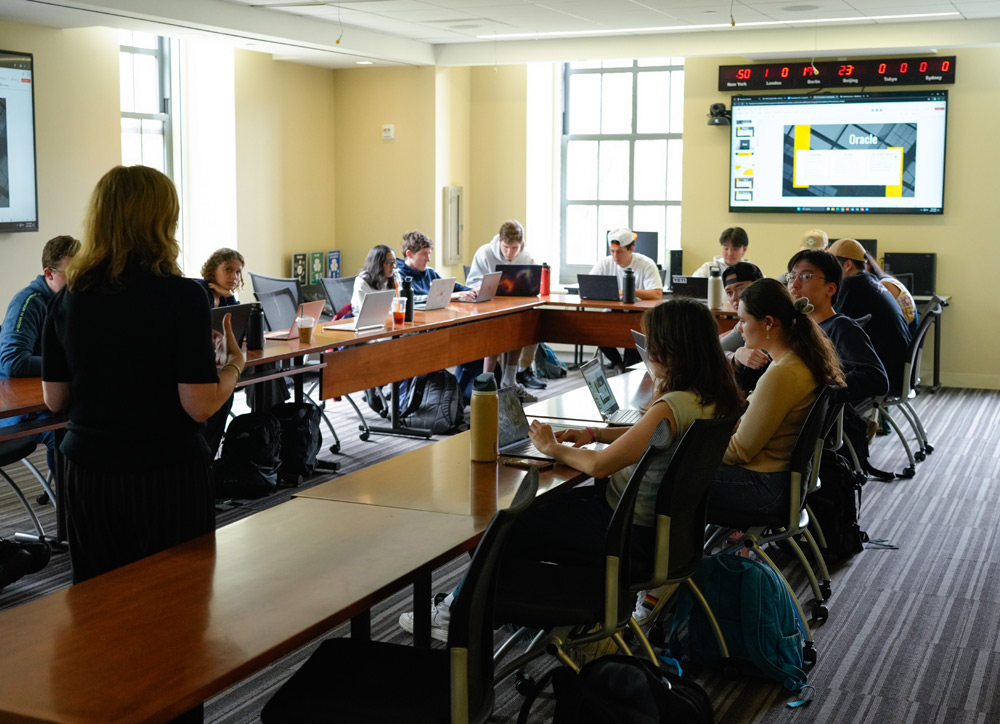Shaping Our Future and Embracing Change
Since February 2024, the Gabelli School community has been laser focused on creating a comprehensive strategic plan that will move the School forward—in new and innovative ways—during an era of unprecedented change within higher education and across the global business landscape.
After months of intensive research and trend analysis, coupled with introspection, deep and revealing conversations, and creative collaboration among faculty and staff members, administrators, alumni, students, advisory board members, and industry partners, the School is launching a five-year Strategic Plan that will reimagine and reshape business education at Fordham University and beyond.

Turning Challenges into Opportunities
“It was apparent that we were at a pivotal turning point in our history—one that required us to implement transformational changes to meet the needs of the learners and the business communities we serve, align our goals with the University’s Strategic Plan, and expand our reputation as a thought leader in business education, all while addressing seismic shifts in the marketplace and society at large,” said Lerzan Aksoy, Ph.D., dean, George N. Jean Ph.D. chair, and professor of marketing, Gabelli School of Business.
The strategic planning process was facilitated by a Strategic Planning Oversight Team, which included Aksoy; Greer Jason-DiBartolo, Ph.D., (GSE ’10), associate dean of strategic initiatives and executive director of operations; Robert P. Gach, (GABELLI ’80), chair of the Gabelli School Advisory Council and an adjunct professor; and consultant, Angie Fuessel, Ed.D., principal and founder of NovoVigeo Consulting. A Strategic Planning Steering Group and Project Team also were instrumental in its success.
“It was an intentional, inclusive, multi-stakeholder process,” Aksoy asserted. “The idea was to ensure that everybody’s voice was heard. We included many viewpoints and concepts that bubbled up—particularly those that were the strongest in terms of moving our school forward. As a result, we have bold and courageous ambitions for the future of the Gabelli School of Business and a solid plan to take us there.”

Goals: Innovation, Community, & Impact
Innovation involves reimagining the Gabelli School’s business and operating models to achieve greater efficiencies and ensure the School is poised to adapt to change. It also necessitates the development of a transdisciplinary approach to research, teaching, and learning, as well as the creation of new academic offerings focused on the future of business, moving society forward, and protecting people and planet.
Community points to fostering wellness, learning, and growth among students, faculty, and staff, while also expanding relationships with industry partners. “There are so many opportunities to collaborate and build strategic alliances that are mutually beneficial,” Aksoy acknowledged. The School recently hired a senior director for external partnerships and engagement, who will focus, in collaboration with faculty members and administrators, on cultivating and growing these relationships.
Impact includes delivering transformative education that influences individuals, organizations, and society at large, and leverages business as a catalyst for global change that matters.
A Roadmap for Success
- Reimagining the lifelong learning journey from applicant to alumnus
- Prioritizing faculty and staff wellness, learning, and growth
- Establishing and growing three to five Institutes of Excellence
- Implementing innovations across programs and curriculum to meet students’ learning needs and prepare them for the jobs of the future
- Developing new partnership models and driving alternative revenue streams
- Cultivating strategic partnerships in the Bronx, New York City, and the tri-state area
- Transforming the School’s business and operating models to become more efficient and agile
- Building brand awareness, elevating the Gabelli School’s reputation, and growing enrollment

Convening Leaders Across Industry & Academia to Shape the Future of Business
“The idea is to turn the lens onto business or societal problems or opportunities and think about how the entire University can come together to drive that thinking,” said Robert Gach, who is leading this undertaking with Mohammad Nejad, Ph.D., associate professor of marketing and marketing area chair at the Gabelli School. “Rather than pitching a center that has a core competence, we want to pitch the University and the Gabelli School of Business as a series of competencies that can address critical business or societal issues.”
Gach and Nejad are collaborating with colleagues to develop a process for launching the Institutes of Excellence and will explore piloting ideas later this year. Once they are established with the support of corporate partners, the Institutes will further elevate the Gabelli School’s global reputation through thought leadership conferences and consulting projects that will create new revenue streams.

Propelling the Jesuit Business School of New York City into the Future
“In alignment with Fordham University’s Strategic Plan, we will continue to cultivate transformative Jesuit education, while building communities of belonging, and forging local, national, and global partnerships—all critical to ensuring our success,” she asserted. “As we implement the Gabelli School’s Strategic Plan, we will incorporate new ideas while expanding upon decades of growth, innovation, and success. We will be living our deeply rooted Jesuit values while embracing the future and all that is to come.”